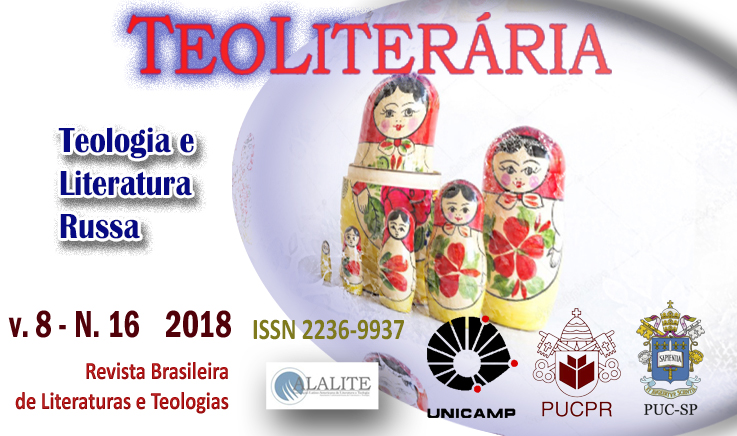Dostoevsky: Religion, Art, and Nihilism
DOI:
https://doi.org/10.19143/2236-9937.2018v8n16p46-60Palavras-chave:
Fiodor Dostoevsky, Theopoetic, Theology and Russian, Literature, Nihilism, ApophaticismResumo
To interpret Dostoevsky's thinking as a kind of apophatic method means to assume the impossibility of understanding it without first assuming the intrinsic connection between religion and art, which is the basis of his realism. By separating aesthetics from religion in Dostoevsky's works, one runs the risk of falling into the common misunderstanding of a certain criticism which considered that the aesthetic deconstruction experienced by the artist did not reach the fundamental nucleus of the religious thinker. This paper will argue that the apophatic suspension wich offers the religious tone to Dostoevsky's works is the result of a particular aesthetic reconfiguration of religion in the light of nihilism and can be interpreted as a particular interweaving between the aesthetic-religious elements found in Shakespeare and Cervantes, and the core of the apophatic spirituality of Eastern Christianity.
Referências
Bibliography
Allen, E. Beyond Realism: Turgenev's Poetics of Secular Salvation, Stanford University Press, 1992,
Berdiaev, N. Dostoievsky. Sheed & Ward Inc, New York, 1934.
Derrida, J. Speech and Phenomena, and Other Essays on Husserl's Theory of Signs, Northwestern, 1973.
Dostoyevsky, Fyodor, Complete Letters: 1868-1871 ... Editors, David Allan Lowe, Ronald Meyer. V. III. Ardis, 1990.
___________. Writer's Diary. Northwestern University Press, 1994.
___________. Winter notes on summer impressions. Evanston: Northwestern University Press, 1988.
___________. The Brothers Karamazov. W. W. Norton & Company, 2011.
___________. The Idiot. New York, Dover Publications, Inc, 2013.
Clement, O. Le visage intérieur. Stock, Paris, 1978.
Desseille, P. La spiritualité orthodoxe et la philocalie, Placide Deseille, 1997.
Epstein, M. Genis, A. Vladiv-Glover, S. Russian Postmodernism: New Perspectives on Post-Soviet Culture. New York, Berghahn Books, 1999.
Florovsky, G. Theology and literature. Collected Works of Georges Florovsky: Volume 11, Nordland Publishing Company, 1972.
Guardini, R. L'univers religieux de Dostoïevski. Paris: Ed. Du Seuil, 1947.
Jackson, R.L. Dialogues with Dostoevsky: The Overwhelming Questions. Stanford University Press: Stanford California, 1992.
Jones, M. Dostoevsky and the dynamics of religious experience, Anthem Press, 2005.
Pattison, G; Thompson, D. Dostoevsky and the Christian Tradition. Cambridge University Press, 2001.
Kearney, R. Anatheism: Returning to God After God. Columbia University Press, 2011.
Kostalevsky, M. Dostoevsky and Soloviev: The Art of Integral Vision, New Haven: Yale University Press, 1997.
Lukács, G. Selected Correspondence (1902-1920). Edited by Judith Markus and Zaltan Tar. New York: Columbia University Press, 1986
________. The Theory of the Novel. Cambridge: MIT Press, 1971. 1983.
Mc Reynolds, S. Dostoevsky Studies (13), Dostoevsky and Christianity, Attempto, 2009.
______________. Dostoevsky in Europe: the political as the spiritual. Partisan Review. 69.1 (Winter 2002).
Mikhailovsky, N.K. A Cruel Talent. Ann Arbor, Michigan: Ardis, 1978.
Medzhibovskaya, I. Tolstoy and the religious culture of his time. A biography of a long conversion, 1845-1887. New York, 2008.
Soloviev, V. The Heart of Reality, University of Notre Dame, 2003.
Tolstoy, L. What I Believe: My Religion, The Free Age Press, 1902.
_________. What is Art, Indianapolis, Hackett Publishing, 1996.
_________. Tolstoy on Shakespeare. A critical Essay on Shakespeare. New York & London, Funk & Wagnalls Company, 1906
Turgeniev, I. The Essential Turgenev, Evanston, Northwestern, 1994.
Venturi, F. Roots of Revolution. A History of the Populist And Socialist Movements In Nineteenth Century Russia, Alfred A Knopf, 1960.
Ziolkowski, E. The Sanctification of Don Quixote: From Hidalgo to Priest. University Park: Penn State Press, 1991
Downloads
Publicado
Como Citar
Edição
Seção
Licença
Copyright (c) 2018 TEOLITERARIA - Revista de Literaturas e Teologias ISSN 2236-9937

Este trabalho está licenciado sob uma licença Creative Commons Attribution 4.0 International License.
A TeoLiterária – Revista de Literaturas e Teologias é detentora dos direitos autorais de todos os artigos publicados por ela. A reprodução total dos textos em outras publicações, ou para qualquer outro fim, por quaisquer meios, requer autorização por escrito do editor. Reproduções parciais de artigos (resumo, abstract, mais de 500 palavras de texto, tabelas, figuras e outras ilustrações) deverão ter permissão por escrito do editor e dos autores.



